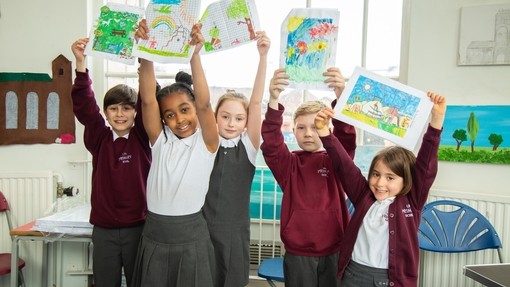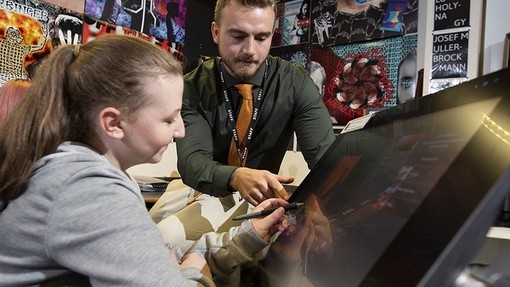
School should be more than merely passing exams
Peter Robinson from Our Lady’s Catholic High School talked to The Guardian about how achieving an Artsmark Platinum Award can change the life of a school…
It’s amazing the difference the arts can make in a child’s life, says music teacher Peter Robinson. He’s seen withdrawn pupils blossom when they master an instrument. A girl too shy to answer the register learned, over time, to play the drums and other parts of her school life have slotted into place. “It’s lovely. She’s gone from finding interaction with staff and pupils extremely difficult to growing in terms of confidence and communication skills. She wouldn’t have done that if she hadn’t had this positive experience.”
Robinson is principal music teacher at Our Lady’s Catholic High School in Preston. Judged outstanding by Ofsted, Robinson’s school has also achieved the highest accolade from the Arts Council England – a Platinum Artsmark Award, which recognises the breadth of creative achievement throughout the school and beyond.
For secondary schools to embrace the creative arts is, he says, a leap of faith. When pressures are on pupils to progress and excel in core subjects, schools feel obliged to prioritise traditional academic teaching. Especially so since new measures (Progress 8) were introduced in 2016 to gauge pupils’ progress across eight key subjects. But many teachers, and the creative industries alike, fear that the arts are being squeezed out.
“If you want better maths and English results, it can be tempting to spend more on maths and English teaching, but that will only get you so far,” says Robinson. His school has instead pursued a long-term policy of coaxing creativity out of its pupils and investing in the arts”.
“We are both a creative and an ambitious school,” he says. “Arts have a powerful effect on other subjects. They’re integral to the success of our school, and vice versa. They go hand in hand.” As proof, Artsmark has recognised the school at the highest level. “At this level, it’s about deeply embedding arts and culture across the whole school,” says Amanda Rigler, senior officer for Artsmark. “This award recognises how schools allow creative arts to come alive in every subject, and use them to create happy and confident young people.”
Why should schools follow the lead of Our Lady’s Catholic High School and apply? For one, creative arts give schools breadth and balance, says Arts Council England chief executive Darren Henley. “Our goal is for every child and young person to have the opportunity to experience the richness of the arts,” he says.
To take part, schools must submit a commitment to reaching creative goals, which the schools themselves will implement and evaluate over a period of up to two years. Local networks are on hand throughout that time with advice and support. “Applying for Artsmark is light on paperwork and schools are supported throughout the whole process,” says Rigler.
How has Robinson’s school attained this recognition? It’s a long game, he says – achieved through careful spending decisions and good levels of discipline. Crucially, the commitment has come from on high. While head teacher Nigel Ranson is a scientist by education, he’s convinced of the benefits of a creative culture within education.
“Many of our great scientists were exceptionally artistic and creative people,” he says. “Many modern-day scientists also often have strongly creative backgrounds and vice versa: professor Brian Cox was a keyboard player in D:Ream and Queen musician Brian May has a PhD in astrophysics. My experience, as a teacher of physics for over 30 years, is that when we nurture creative understanding and expression in our pupils, they develop as more rounded, tolerant and positive individuals. They also become better scientists and mathematicians, so everyone wins.”
As part of its long-term plan, the school has souped-up its creative arts facilities – with refurbished arts spaces, new music technology and a new theatre equipped with the latest lighting and technology.
“What we can do with new technology now is incredible,” says Robinson. “By the time pupils get to year 9, we’ll have a class of 30 all playing in bands of four together – all plugged in and with headphones on, and I can listen to each pupil individually – it’s phenomenal.”
By engaging extra drama staff and calling on staff from other departments to support with their skills, the school has been able to stage an extra show each year. “One of our IT Technicians is an intrinsic part of set design/construction and sound engineering for all of our productions. In addition to this our art and support staff help each year with the art work for school productions,” says Robinson. “We celebrate Book Week rather than World Book Day, holding a staff panto on the final day, when all the staff – and many of the pupils – dress up as characters from well-known books.”
Nearly 100 pupils attend after-school drama clubs, and other arts subjects are similarly healthy. Students taking GCSE art have exhibited their work at a local gallery, mixing with professional artists at the opening. “We’ve been blown away by how well this works,” says Robinson.
Vicky Booth, principal art teacher, says this has not only opened students eyes to the possibilities of actual careers in the creative industries, but has also given them memories to cherish. “We want pupils to expand, participate in and enjoy the culture on offer in the UK. School should be more than merely passing exams,” she adds. Results at GCSE reflect the investment, with pupils securing high grades in art, drama and music and nearly two thirds of students (64%) choosing at least one arts subject”.
“For me, as a musician, the most important element of creativity is improvisation – without this there’d be no creativity,” says Robinson. “Pupils need to be comfortable with this – it seems contrary to what secondary school is about, but it absolutely isn’t.”
He believes students need to learn to express themselves through the arts – and be ambitious about what they achieve – for their own happiness. “They find they can do things they thought they couldn’t,” he says. “And this has such a powerful effect on everything else.”
Register for Artsmark here


